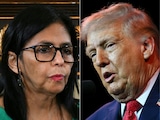- Trump claimed to have ended seven wars in his second presidency, including three lasting over 30 years
- He asserted involvement in peace deals between India and Pakistan, Thailand and Cambodia, and DRC and Rwanda
- Experts dispute Trump's claims, citing unresolved issues and ongoing conflicts in these regions
As President Donald Trump tries to broker an end to the Russia-Ukraine war, he claimed he has ended "seven wars" in the first few months of his second presidency. Without going into details, Trump said that three of the conflicts he helped resolve had been ongoing for over three decades.
Talking to reporters about progress in truce talks between Russia and Ukraine, Trump said, "I settled seven wars. The one that I thought would be maybe one of the easiest...But the one that I thought would be an easier one because of my relationship with President Putin and with Ukraine and everything else... I thought it would be the Russia-Ukraine disaster where this week 7,014 people were killed, in most cases soldiers...But that's turned out to be the most difficult of the group."
"You know, I settled three wars. One was 31 years going, a lot of people killed, 10 million people. Another was 34 and another was 37 years, it was going on. And people said you can't settle them and I settled them. This one [Russia-Ukraine war] turned out to be more difficult, but we'll get it," Trump added.
What Are All The Wars That Trump Claimed To Have Ended
1-India and Pakistan
Trump and his team, on multiple occasions, have claimed to have brokered a peace deal between India and Pakistan and that the US got directly involved in delivering peace. However, India has denied the claim and maintained that a ceasefire was reached after the Pakistani Director General of Military Operations (DGMO) called his Indian counterpart and requested an immediate truce as Pakistan was desperate following India's strikes.
2-Thailand and Cambodia
Trump has claimed that his intervention in the Thailand-Cambodia conflict helped push the two countries towards a ceasefire. According to Petra Alderman, manager of the London School of Economics and Political Science's Saw Swee Hock Southeast Asia Centre, Thailand was initially resistant to any mediation of the conflict that claimed more than 33 lives in four days and saw hundreds of thousands of people displaced.
The breakthrough came when Trump phoned leaders of both countries, effectively threatening a suspension of trade talks.
"As both countries have export-dependent economies, neither could have afforded Trump's 'liberation day' tariffs. Securing a trade deal with the US took precedence over the border conflict but did nothing to resolve its root causes. Future flare-ups are still possible," she said.
3- Democratic Republic of Congo and Rwanda
Trump has claimed he helped in easing the hostility between Rwanda and the Democratic Republic of Congo (DRC), nations with a 30-year-old troubled history. However, Jonathan Beloff, a postdoctoral researcher at the Department of War Studies at King's College London, told The Conversation that the US-brokered peace agreement between African nations ignores their history.
Beloff argued that Trump's claim that the agreement ends 30 years of fighting is historically inaccurate. He explained that after the end of Rwanda's 1994 genocide against the Tutsi, hundreds of thousands of Rwandans fled into eastern DRC. The refugees also included elements of the genocide regime who wanted to finish their genocide, which led to the first Congo war (1996-97) and the second Congo war (1998-2003).
Due to this, the DRC remains fractured with over 120 rebel groups. A lack of governance and proper economic strategies in the country is also a breeding ground for rebel forces, Beloff noted.
"The agreement provides scant details about how to address these issues, which led to a recent breakdown in the Congolese negotiations with the M23 rebel group," he added.
4-Kosovo and Serbia
Trump has also claimed that his mediation between Kosovo and Serbia led to agreements being reached to normalise economic ties. But according to Stefan Wolff, a professor of international security at the University of Birmingham, none of the underlying issues between the two countries had yet been resolved.
Wolff, though, added that Trump did get an agreement on the normalisation of economic relations between Kosovo and Serbia back in 2020. "If there really was something significant [in 2025], there would be more evidence," he added.
5-Armenia and Azerbaijan
Trump has claimed his efforts brought calm in Armenia and Azerbaijan's 35-year conflict, where long-standing clashes over Nagorno-Karabakh had intensified. However, Ayla Gol, a senior lecturer in international relations at York St. John University, said, "On paper, the draft deal offers a clear path to improved relations. But it has no concrete plan for the return of the over 100,000 Armenians who fled Nagorno-Karabakh in 2023."
6-Israel and Iran
Trump has asserted that his administration's actions curbed tensions between Israel and Iran, both of which were engaged in hostile exchanges earlier this year. But Scott Lucas, a professor of international politics at University College Dublin, pointed out that the question of who ended the Iran-Israel conflict, which began in June 2025, should also be considered in terms of how it started.
"The fact of the matter is that when the Israelis attacked Iran, they effectively sidelined the US-Iran negotiations, which were ongoing. At that point, the Trump administration didn't object to the fact that their attempt to deal with Iran's nuclear programme had been completely undone by the Israeli assault. So to simply say that Trump ended the war between Israel and Iran ignores the whole 12 days and how that occurred."
7-Egypt and Ethiopia (Nile dispute)
According to Trump, his intervention helped curb friction between Egypt and Ethiopia, who were at odds over Ethiopia's new Nile dam project.















